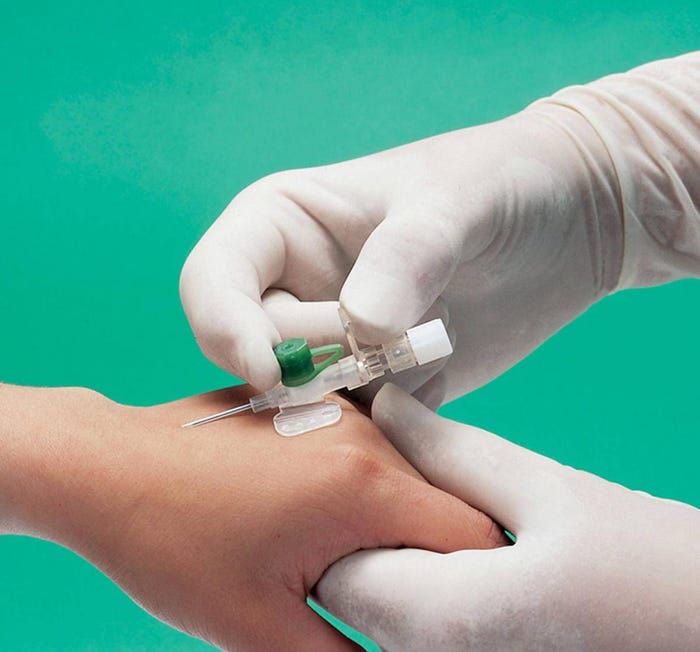Kaiser Permanente bans PVC tubing and bags
Kaiser Permanente, which spends $1 billion annually on medical supplies, announced this morning that it will no longer buy intravenous (IV) medical equipment made with polyvinyl chloride (PVC) and DEHP (di-2-ethyl hexyl phthalate) -type plasticizers.
January 19, 2012
Kaiser Permanente, which spends $1 billion annually on medical supplies, announced this morning that it will no longer buy intravenous (IV) medical equipment made with polyvinyl chloride (PVC) and DEHP (di-2-ethyl hexyl phthalate) -type plasticizers.
The huge health West Coast health provider announced two years ago a plan to become more green and move away from PVC and today's announcement marks a challenge to PVC's dominant role in flexible tubing, bags and other supplies used in health care. Kaiser Permanente purchases 4.9 million IV tubing sets and 9.2 million solution bags each year.
|
What plastics are safe for medical use? The battle is heating up. Photo shows a generic syringe application. |
"We at Kaiser Permanente recognize that the products we buy can have a direct effect on human health and the health of our environment," said Raymond J. Baxter, senior vice president for Community Benefit, Research and Health Policy. "Our efforts to remove harmful chemicals from hospitals and clinics reflect our commitment to the total health of our members and our communities."
Surprising aspect
One of the most surprising aspects of the announcement is that Kaiser Permanente said it will save close to $5 million annually as a result of the conversion. Details were not immediately available. Conversion of PVC to alternatives, such as elastomers, is generally significantly more expensive. It wasn't clear if the savings reported by KP are due to an aggressive supplier anxious to get a big piece of business or a migration to materials that truly are less costly.
Kaiser Permanente launched a Sustainability Scorecard, described as the first of its kind in health care, in 2010 in an effort to evaluate the environmental and health impacts of each medical item it purchases and to encourage suppliers across the industry to provide greener products for the health care sector. The scorecard requires suppliers to provide information on their company's environmental commitment, use of potentially harmful chemicals in their products and information about product and packaging recycling.
"Kaiser Permanente recognizes we can improve health today and for the future by taking a close look at the products we purchase," said Barry Brenner, vice president for medical sourcing at Kaiser Permanente. "With Kaiser Permanente's size and influence, we are able to move the industry to create greener products."
Health effects challenged
It has been widely reported that long-term exposure to DEHP, used as a plasticizer in medical devices such as IV bags and tubing, can affect the body's endocrine system, resulting in hormonal abnormalities, particularly in infants. When PVC plastic is manufactured or incinerated, dioxin pollution may be created. Dioxin is a known carcinogen.
Those issues are hotly contested by the Vinyl Institute, a trade group representing PVC producers and other companies in the vinyl supply chain.
The group states on its Web site: "The most complete, comprehensive studies of the life-cycle health and environmental impacts of PVC/vinyl versus competing materials have shown consistently that vinyl's impacts are in line with those of other materials - and can be lower."
Prior to yesterday's announcement, the Vinyl Institute commented: "Kaiser Permanente is an example of a company that says it is trying to move out of PVC even as it continues to use PVC products because they are the best for the job. The Vinyl Institute has written to Kaiser asking the company to publish the data that shows that the alternatives to PVC/vinyl they have found are safer and have less environmental impact throughout their lives."
'Walk the walk'
In an interview with PlasticsToday this morning, Allen Blakey, vice presient of industry and government affairs for the Vinyl Institute, said: "They need to prove they can do better (in terms of health benefits of aternate materials). Talk is cheap. They need to walk the walk."
The PVC ban is just one aspect of Kaiser Permanente's green efforts.
Through a green building program, Kaiser Permanente saves more than $10 million per year and has eliminated the purchase and disposal of 40 tons of harmful chemicals in its facilities. For example, the organization has worked with suppliers to virtually eliminate the use of products and equipment that contain mercury, which is a neurotoxin. Last year, the organization announced it had agreed to deploy up to 15 megawatts of solar power in a deal that has placed solar panels at Kaiser Permanente facilities across California.
The health provider has also won awards for its efforts to reduce the environmental burden of its computer and overall electronics buy.
You May Also Like



